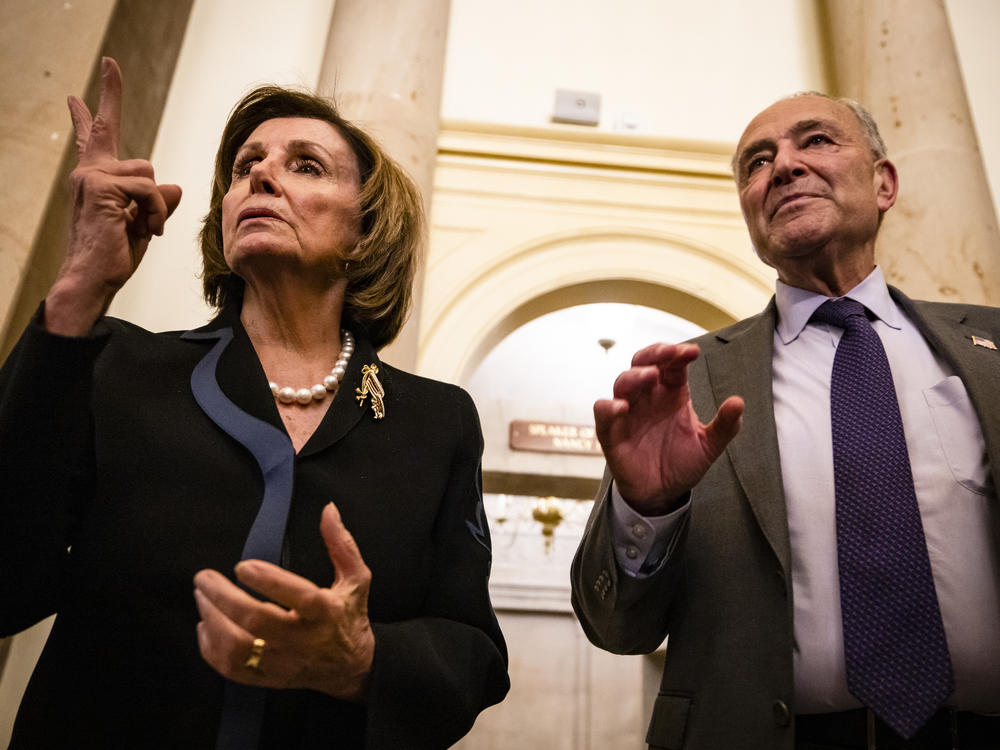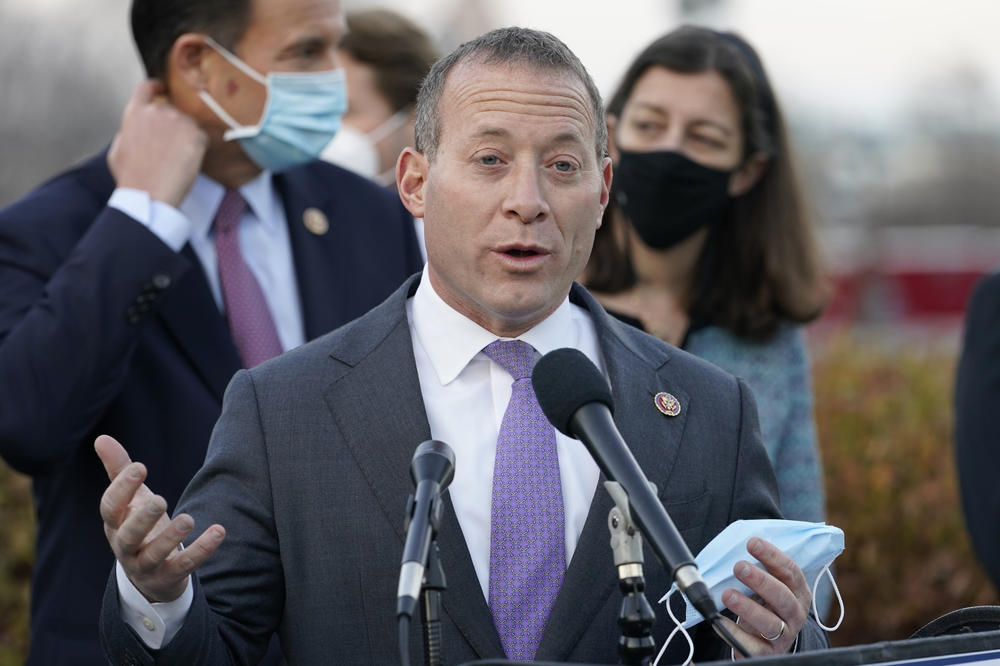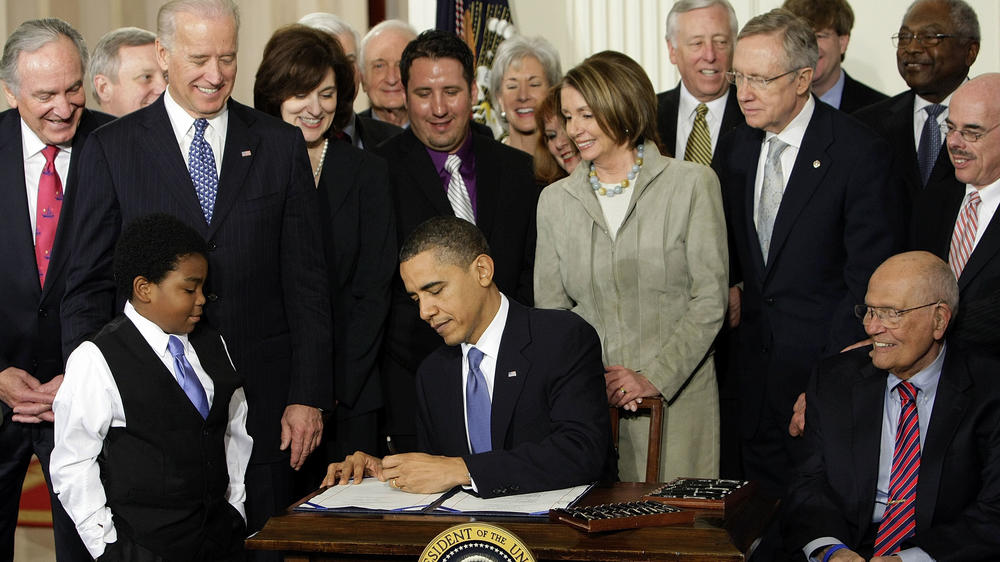Section Branding
Header Content
Here's How Democrats Get Their Domestic Agenda Through — And It's Not Easy
Primary Content
For Democrats, getting their historic domestic agenda done was already going to be a tough needle to thread, with a narrowly divided Congress and tensions within the party itself.
But now, because of the resurgent coronavirus due to the delta variant and the chaotic U.S. withdrawal in Afghanistan, President Biden's approval rating has dropped. His reduced influence and political capital don't leave much room for error on items that might be difficult to get through Congress.
And it doesn't get much more challenging than the path Democratic leaders are going down, pushing dual-track, multitrillion-dollar pieces of legislation — a $1 trillion infrastructure bill and a budget plan that could be $3.5 trillion.
"I think it is like backing a big semitrailer truck into a small loading dock," David Axelrod, a former senior adviser in the Obama White House, said in a recent interview. "It is an arduous, precise kind of maneuver where you have to move a little to the left, a little to the right, and hope at the end of the day, you land it right."
At the same time, Biden's recent political troubles have increased Democrats' sense of urgency to get as much done as possible, as quickly as possible, especially as party leaders and operatives are growing increasingly pessimistic about Democrats retaining control of the House of Representatives after next year's elections.
"The Biden-Harris administration has a one-track mind — to get as much done, to make as much progress as possible," said Donna Brazile, a veteran Democratic strategist who has worked on Capitol Hill and on presidential campaigns since the 1980s. "They understand next year everyone will be focused on their reelection."
Facing the possibility that these could be the last major pieces of legislation for the Biden presidency if they lose the House, Democratic leaders are having to perform a familiar progressive-versus-moderate balancing act, one that is wobbly at best.
What is being considered, and what is the timeline?
There is the bipartisan infrastructure bill that easily passed in the Senate. But for it to become law, the much larger spending blueprint has to pass along Democratic Party lines. That's the deal Democratic leaders have cut to keep their caucus together.
The tactics to get even this close to the finish line are complicated and surprising on the one hand, but simple and predictable on the other. After all, just 16 of the 435 members of the House and six of 100 senators come from districts and states won by the 2020 presidential candidate of the opposite party. So the incentives to negotiate are limited, and the creativity required boundless.
The Democrats' deal is a sign of the evolution of how agreements are struck in Congress in these hyper-partisan times — with a president who made reaching out to Republicans a centerpiece of his presidential campaign.
The timeline for when these bills could pass is up in the air, with House votes this week and final passage not taking place until mid-September or into the fall — and that's only if everything goes well.
There are plenty of hurdles in the way. Moderates at risk in next year's midterms are balking at the size of the partisan bill — and don't want to put themselves out on a limb without the cover of the bipartisan bill.
They say they're open to considering the other, bigger spending plan, but they want to pass the bipartisan legislation first.
"You don't hold up a major priority of the country, and millions of jobs, as some form of leverage. The infrastructure bill is not a political football," several moderate House Democrats wrote in an op-ed published Sunday night in The Washington Post.
The Senate's more conservative Democrats are also critical of the current plan.
Despite the uncertainty, House Speaker Nancy Pelosi, D-Calif., and Senate Majority Leader Chuck Schumer, D-N.Y., have pledged to stick to the two-track process. It's seen as the only way to get either spending measure passed.
Progressives are tired of half-measures
With a Democrat in the White House and the rare control of both chambers of Congress, progressives feel the time is now to get done as much as possible.
They feel too many, including the planet itself, are being left behind and struggling to survive. They're tired of seeing moderates take less than progressives think is possible — and they're beginning to target their own. The person they've gone after lately is Democratic Rep. Josh Gottheimer of New Jersey, one of the leaders of the moderates.
"He's being celebrated right now by the worst of the political establishment for leading an effort to block new investments in child care, paid family leave, Medicare, and fighting the climate crisis," Justice Democrats wrote in a fundraising email Friday. The group has backed left-wing members of Congress such as Rep. Alexandria Ocasio-Cortez, D-N.Y.
Politically, progressives note, midterms are about base energy, so while the bigger spending package may put some moderates at risk, progressives counter that not passing it may decrease enthusiasm among base Democrats.
To that point, Axelrod contended that passing the larger bill may help — not hurt — Democrats' chances of holding the House because, in many cases, voters would feel the benefits immediately.
Moderate Democrats mostly agree with the direction progressives want to go, but some feel they can't appear to be going too far and endanger their reelection chances in less liberal districts — and thereby risk the Democratic majority.
"It's a more diverse party than the Republican Party," Axelrod said, "and that is in some ways a strength and, in some ways, a curse — and I lived through this when we were trying to pass the Affordable Care Act."
A history of tension
The debate about a dozen years ago featured a somewhat similar tandem-bill effort, and the standoff then between the moderate and progressive wings centered around the inclusion or exclusion of a public health care option in the ACA.
Axelrod said some moderate Democrats were "inexorably opposed" to the public option, but for some progressives, it was the be-all and end-all.
Obamacare eventually passed — without a public option — and it took longer than the party would have liked. Many believe the prolonged fight cost Democrats in swing districts. In 2010, the party lost 63 House seats, the most in a midterm since 1938.
In the 1990s, there was a similar push for health care under then-President Bill Clinton. Paul Begala, who was an adviser in Clinton's inner circle back then, said he regrets urging Clinton to veto anything that didn't provide universal coverage.
"We were feeling our oats," he said. "Our dream of comprehensive national health care had been part of Democratic orthodoxy. We very wrongly felt, 'Let's go for the whole thing.' We were never going to be more popular. We had the wind at our back."
But they ran into more resistance than they thought. Begala said there was an opportunity to take a deal from then-Sen. Bob Dole, R-Kan., who offered a plan that looked similar to Obamacare today. But Begala "stupidly," he said, advised Clinton against taking the deal.
"Dole and others were perfectly happy to work toward a compromise," Begala said. "We didn't seize on it. We thought we could get it through without it. We didn't, and we got nothing."
While the experience changed how he thought, Begala credits progressives for making this current moment even possible.
"They moved the Overton window," he said, "so a moderate like Biden could oversee a $1 trillion infrastructure bill."
Brazile said this party tension is "not new," but that it's a new chapter in how negotiating in an increasingly partisan political climate needs to take place.
"During the days of Reagan Democrats, we got things done," she added. "We worked with Blue Dogs, Yellow Dogs — we've had so many damn dogs, I should get a kennel. But the truth is what matters, at the end of the day, is making meaningful progress toward the America we all believe in."
The majority hangs in the balance
Republicans need to flip just five seats to take control of the House. And history says they undoubtedly start with the advantage heading into next year's midterms. Since World War II, the president's party has lost an average of nearly 26 congressional seats during the first midterm of a presidency.
What's more, Republicans are expected to benefit from redistricting. With their control of more legislatures across the country, they could gain about eight seats, according to the Cook Political Report, just based on new political maps.
Republicans are becoming more confident they will wrest congressional control next year. They have already been hammering Democrats on inflation, gas prices, a surge of migrants at the southern U.S. border and a rise in violent crime in many cities. They have also tried to stir their base with culture issues, such as teaching Black history in schools and allowing trans athletes to play sports.
Now, they see their opportunity growing with the withdrawal from Afghanistan and the jump in coronavirus cases, which have dented Biden's approval ratings.
Brazile said Democrats will be "judged on what they did to make our lives better. Republicans will campaign on saying, 'I tried to stop it.' Democrats learned that lesson the hard way."
So they need to get as much done now as they can, she added, because, "In politics, nothing is guaranteed."
Copyright 2021 NPR. To see more, visit https://www.npr.org.



